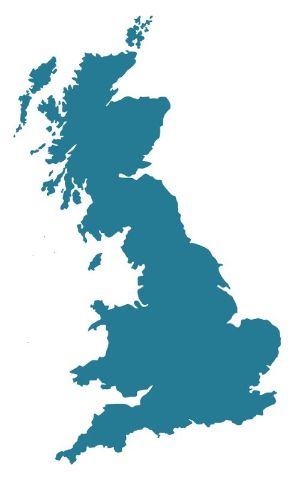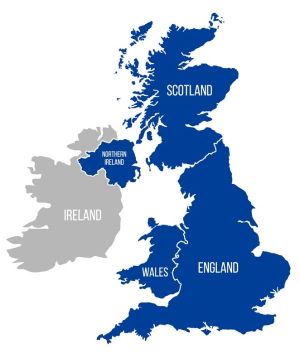The Difference Between the UK, Great Britain and England

A lot of people get confused by different terms for the political or geographic body that includes England; some people will use Great Britain and the U.K. interchangeably. There are, however, some key differences between Britain, Great Britain, the United Kingdom, and England.

Roman Britannia, or "Britain"
The name "Britain" comes from an old Roman name "Britannia," used for the regions we'd now identify as England and Wales. Britannia was the territory under Roman rule, which ended at Hadrian's Wall (which divided Scotland, or "Caledonia," from Britannia).
This should not be confused with Brittany in France. They are connected, though. Brittany was, at one time, called "Lesser Britain" (as opposed to "Great Britain") since it was settled by Britons from across the Channel.
England
England is a country that is part of the United Kingdom. England is the largest and most populous nation in the UK. It is bounded by Wales and the Irish Sea to the west and Scotland to the north. The English Channel, the Strait of Dover, and the North Sea separate it from Europe to the east. The channel islands like the Isle of Wight, off the southern mainland in the English Channel are considered part of England. The Isles of Scilly, in the Atlantic Ocean off the southwestern tip of the mainland, are also considered part of England.
Great Britain
The island of Great Britain, also called "Albion" by the Romans, consists of three somewhat autonomous regions that include England, Scotland and Wales. It is located east of Ireland and northwest of France in the Atlantic Ocean. The term also includes several offshore islands, including the Hebrides in Scotland.
The United Kingdom
The United Kingdom (commonly abbreviated UK) is a country that includes England, Scotland, Wales and Northern Ireland. Its official name is the United Kingdom of Great Britain and Northern Ireland. While England, Wales, Scotland and Northern Ireland are called countries, there exist regulations and policies in those states that are determined by the UK. The capital city of the United Kingdom is London, although the different countries maintain parliaments in Cardiff (Wales), Edinburgh (Scotland), and Belfast (Northern Ireland).
The U.K. formerly encompassed the entire island of Ireland, and the islands were collectively referred to as the British Isles. But, in the early 20th century much of Ireland won autonomy as the Irish Free State, and later won independence as the Republic of Ireland.
The United Kingdom comprises, quite literally, the united kingdoms of Scotland and England. They shared monarchs for generations, but were distinct entities. That changed when the Scottish king James Stuart (James I of England and James VI of Scotland) inherited the throne of England from Elizabeth I. James was the grandson of Margaret Tudor, sister of Henry VIII. As Elizabeth I was childless, this made him her successor.
A century later, his descendant, Queen Anne of England, Scotland, and Ireland, would pass the Acts of Union. In England and Scotland both, the parliament passed an act of union formalizing a melding of the two states. The result was the United Kingdom of Great Britain. This would later include Ireland after then Acts of Union of 1800.
Welsh people were long considered part of the Kingdom of England. They would not establish their own parliament until the late 1990s.
The term U.K. also includes several dependencies and territories, nations that are political distinct but rely on the U.K. for essential services. These include Gibraltar, the Isle of Man, and other smaller islands.
The Commonwealth of Nations
The Commonwealth of Nations is a voluntary association of 52 states or countries that were formerly part of the British Empire. This does not include the United States.
16 members of the Commonwealth of Nations recognize the United Kingdom's Monarch as their own king or queen, but remain politically independent. These are identified as Commonwealth realms.
33 other Commonwealth countries are republics, which means they don't recognize a monarch. However, they still participate in the partnership.
The Commonwealth has no constitution. The Singapore Declaration of Commonwealth Principles, however, states that the Commonwealth is "a voluntary association of independent sovereign states each responsible for its own policies, consulting and co-operating in the common interests of their peoples and in the promotion of international understanding and world peace."
Members of the Commonwealth of Nations

About the author







